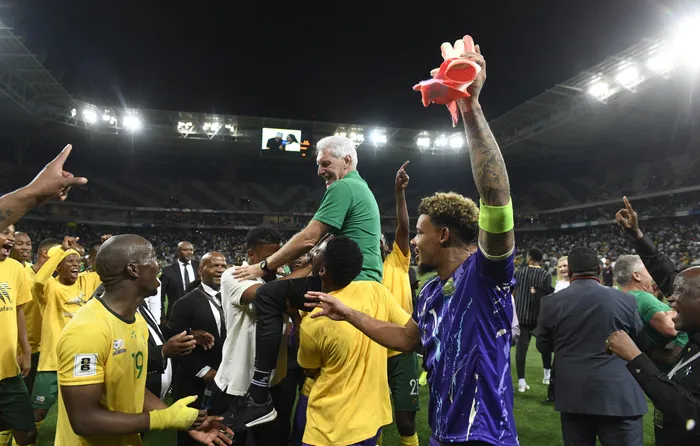Hugo Broos to retire after 2026 World Cup, leaving Bafana Bafana with a new culture

Bafana Bafana head coach Hugo Broos celebrates after guiding South Africa to their first successful World Cup qualification since 2002.
Image: Backpagepix
Bafana Bafana coach Hugo Broos has definitively confirmed his plans to retire from coaching following the 2026 FIFA World Cup.
The 73-year-old manager, who took charge of the South African national side on May 5 2021, has announced that the global tournament will serve as the perfect, sentimental conclusion to his decades-long journey in football.
The announcement of his retirement came after South Africa’s historic 3-0 victory over Rwanda, which sealed their qualification for the 2026 FIFA World Cup in the USA, Canada and Mexico.
Now, although Broos is still very much in charge of Bafana, the announcement of his retirement has already got tongues wagging. You know the usual speculation: What will his departure mean for the team? Who will replace him? How will players adapt to a new coach?
Realistically, these questions are premature. World Cup 2026 is around eight months away.
However, the comments rising to the surface in panel discussions, interviews and social media make his departure seem imminent. And worryingly, there are those voices already stating preferences, some recommending that his replacement should be a local coach, someone who “understands South African football culture”.
Now, to be fair, there’s nothing wrong with SA coaches; many of them are brilliant, exceptional. However, we need to delve into what the concept of South African football culture entails.
Coaching mindset and work ethic
The Belgian coach’s tenure has been credited with rebuilding the national team and guiding them back to the global stage after a 16-year World Cup absence. He has also become the first coach to qualify the senior men's team for two back-to-back Africa Cup of Nations (Afcon) tournaments as well as the World Cup.
So, which culture did Broos embrace to achieve this turnaround?
It turns out that his success is rooted in his strict coaching mindset and work ethic, which transformed the team from a group once accused of lacking hunger and professionalism into a formidable side.
Upon his arrival in the country, Broos observed that players treated the national team “like a holiday”, saying how he noted that players would come for a week, “had fun, trained a little, and went back to their clubs”.
The team was stagnant, unfocused and lacked the resources needed to break them out of their seeming lethargy..
This atmosphere changed decisively under his leadership, as he instituted a strict work ethic: “I told them this is not a holiday, it’s work,” he said.
Rigorous selection criteria
On Tuesday evening, Broos again reminded the gathered media that his methodology involves rigorous selection criteria that extend beyond mere talent.
“I know you did not always agree with the choices I made, and I always said I use a different criteria than you do,” he told the media contingent. “For me, it’s important to have a player with quality first of all, a player with the right mentality secondly, and a player who can do what I ask him, and till now I always succeeded in doing it.”
To his credit, Broos has stuck to his guns regarding his choices, even when critics disagreed with him. He maintained that team building requires having a clear plan and sticking to it, believing it to be the right way.
“Even when you thought this one and that one needed a chance, this is not how you build a team. You need to plan and you need to keep your plan because you know this is the right way and this is what we did in the past three years,” he added.
The commitment and unity displayed by the current Bafana Bafana squad, where they work for each other and correct each other’s mistakes, is what he believes makes them champions.
Broos’s firm approach has paid dividends, moving the national side from being booed by home fans and being doubted, to being respected across Africa.
What he has achieved has been remarkable: the players now believe they belong on the big stage.
Retirement timeline and motivation
Broos’s decision to retire in less than a year from now is confirmed and personal.
He stated that his contract will finish after the World Cup, at which point he will stop coaching. His plan, from the time he was appointed, was to get Bafana Bafana to qualify for the 2026 tournament. Now he has guided the team there, marking the countdown to his final stint in the dugout.
The veteran coach, who has been involved in football since he was in his teens, first as a professional player and then as a coach for nearly 40 years, feels the time is right to step away. He expressed that there must come a moment when one stops, emphatically stating at one point, “I’ve been coaching for nearly 40 years, and I’m 73. There has to be one moment where you have to stop. I will not die on the bench.”
After the World Cup next year, his plan is straightforward: He says he wants to be at home with his wife “and drink coffee”. He looks forward to spending more time with his family, hoping to enjoy the next 20 years with his children and grandchildren.
Broos views this timing as significant because he was previously involved in a World Cup as a player towards the end of his playing career, and now achieving qualification as a coach feels like repeating that cycle for a career conclusion.
However, don’t wave goodbye just yet. Broos is not done. He has maintained focus, reminding the media, “First of all, there is still some work to do,” indicating his commitment to the team and the country until the very end.